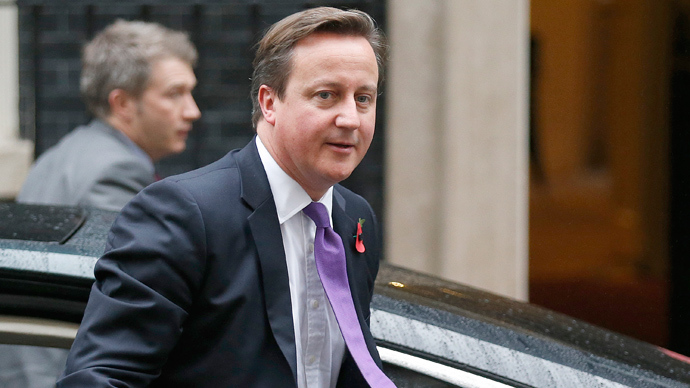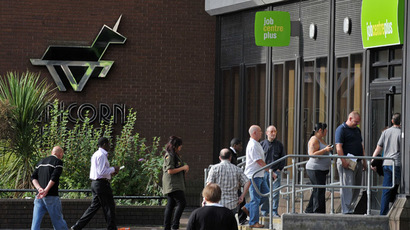Migrant firewall? Cameron targets welfare benefits for EU migrants

Prime Minister David Cameron has proposed a swath of benefit cuts and “free movement” restrictions to EU migrants in a bid to shore up the UK’s social welfare system, as a fresh wave of Bulgarian and Romanian migrants are set to arrive on British soil.
Under the proposed measures introduced late on Tuesday, new migrants would not be eligible for unemployment benefits during their first three months in the country, and unemployment payments would be stopped after six months unless claimants proved they had a “genuine chance of finding a job”.
New migrants would also no longer be able to claim government housing benefits, and those caught begging or sleeping on the streets would be deported with no chance of return for a year.
In a bid to tackle unscrupulous employers, fines would be quadrupled for those found to be paying below the minimum wage.
“We are changing the rules so that no-one can come to this country and expect to get out-of-work benefits immediately," Cameron wrote for the Financial Times.
The Tories' coalition partners, the Liberal Democrats, backed the
package of restrictions as reasonable.
Writing for the Financial Times, Cameron further said it was time
to reevaluate the principle of free movement, a central tenet of
the European Union which had triggered “vast population
movements".
"We need to face the fact that free movement has become a trigger for vast population movements caused by huge disparities in income. That is extracting talent out of countries that need to retain their best people and placing pressure on communities."
Cameron said he would look to sympathetic EU governments to work on allowing member states to halt the number of arrivals if they exceeded a certain threshold. He also said governments could limit the annual number of EU migrants or withhold the right to full freedom of movement until specific countries achieved a certain per capita Gross Domestic Product.

Cameron said he understood the concerns many in Britain had about the EU’s requirement to lift transitional controls limiting Bulgarian and Romanian workers' access to the UK labor market. The measures, which have been in place since the former Eastern Bloc states joined the EU in 2007, will expire at the end of the year.
The PM chastised the previous government for not restricting access to the UK labor market when Poland and nine other countries joined the EU in 2004. The move resulted in a much larger influx of migrants than expected, with an estimated 1 million people from Central and Eastern Europe now living in the UK.
"In 2004, the Labour government made the decision that the UK should opt out completely of transitional controls on the new EU member states. They had the right to impose a seven-year ban before new citizens could come and work here, but – almost alone in Europe – Labour refused it. That was a monumental mistake," he said.
"The EU of today is very different from the EU of 30 years ago," he continued.
The conservatives are facing a growing threat from the anti-immigration UK Independence Party (UKIP), which during the 2013 local election saw the “biggest surge for a fourth party" in British politics since the Second World War, averaging 25 percent of votes in council wards.
UKIP is poised to siphon off votes from the Tories in next year’s European elections and at a national election in 2015. The next election is widely expected to be decided on the effects of Bulgarian and Romanian immigration, prompting Cameron to push for reform.
Cameron has long suggested renegotiating Britain's EU membership to give it more of a say in managing its own affairs. If re-elected in 2015, he has promised to hold a referendum on whether or not to remain within the bloc.
‘You cannot have your cake and eat it, Mr Cameron!’
The European Commission has stressed to the UK that London has to
accept the EU’s freedom of movement rules if it wants to remain a
part of the single market.
"Free movement is non-negotiable," Viviane Reding,
vice-president of the EU executive, said as cited by Reuters.
"If Britain wants to leave the single market, you should say
so. But if Britain wants to stay a part of the single market,
free movement applies.”
“You cannot have your cake and eat it Mr Cameron!" Reding
added.
Earlier, Laszlo Andor, the European Commissioner for Employment and Social Affairs, told BBC radio that EU rules applied equally to all 28 member states and had been agreed to by the UK.

Andor warned Cameron’s "unilateral rhetoric" was unlikely to present viable proportionate solutions to the problem.
"This is an unfortunate over-reaction. We would need a more accurate presentation of the reality, not under such hysteria which sometimes happens in the UK," he said.
"Unilateral rhetoric ... is not really helpful. It risks presenting the UK as a kind of nasty country. We have to look into the situation collectively and act proportionately."
He further said the British public had not been told the truth regarding immigration, arguing existing rules were already in place to safeguard against ‘benefit tourism.’
"If someone new arrives to the UK or another country, it is the home country which in the first phase needs to cover Job Seeker's Allowance, and not the receiving country," he said.
"If we start to dismantle some of the rules of the single
market which should apply to everyone, [other countries] may
invent other ideas and proposals and then we end up on a slippery
slope," he added.














